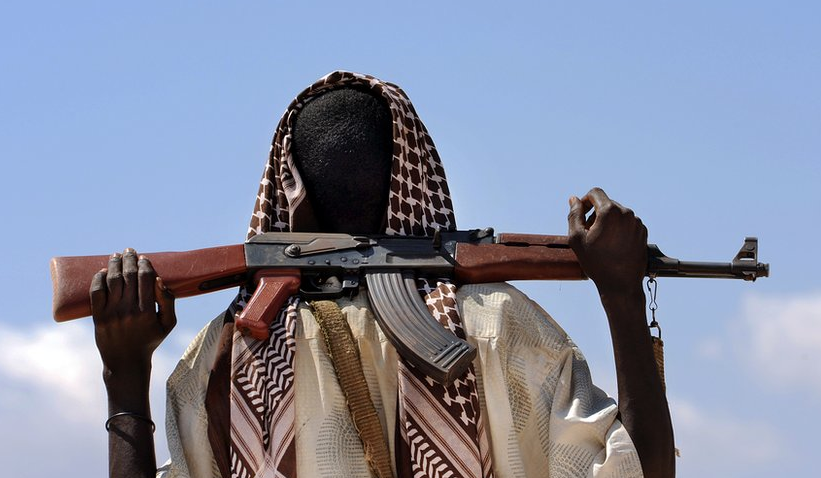Opinion: The misjudegment of Kenyan invasion and its impact
By: Hassanur G. Sheikh
 Kenyan forces have entered Somalia for the first time under the pretext of fighting al shabaab. The invasion comes after dozens of cross-border raids alleged to have been carried out by the Somali militant group, al shabaab- an accusation they deny. So is this really the real intention of the invasion or is there any sinister political agenda behind it?
Kenyan forces have entered Somalia for the first time under the pretext of fighting al shabaab. The invasion comes after dozens of cross-border raids alleged to have been carried out by the Somali militant group, al shabaab- an accusation they deny. So is this really the real intention of the invasion or is there any sinister political agenda behind it?
There are too many theories circulating in the worlds media about the perceived intention of the Kenyan invasion, one being the creation of a semi-autonomous jubaland state called Azania as a buffer zone to keep the chaos and the anarchy of Somalia within its borders- away fromKenya.
There is also a second theory that Kenya has an interest that is bigger than tourism in the coast- this is a pipeline, the estimated cost of $ 16 billion, which would allow the infant state of South Sudan to extract and refine oil without having to depend on the infrastructure of the Sudanese government.” And to develop this according to experts, southern Somalia needs to be pacified as it would be incredibly hard to have such a huge project next to a lawless region.
Others have a firm believe that Kenya wants to annex some parts of Somalia permanently and this was exposed on the recent wiki leaks revelations in which the American government categorically rejected Kenya’s proposal to indefinitely alter the map of Somalia and make it less likely for greater Somalia to flourish encase peace prevails . Kenya has its own Somali population which has been a security nightmare for its government.
There has been a recent property boom in Kenya particularly in Nairobi’s Eastleigh where Somalis have established a gigantic business empire that attracts customers from as far as Nigeria and South Africa .They have also begun to venture outside Eastleigh for the first time and buy properties in an unprecedented scale which catapulted them to the middle class ranks and as well as the wealthy elite of the country.
An array of impressive housing estates have appeared almost everywhere in major cities in Kenya, driven by Somali entrepreneurs who have mastered the art of selling and buying. This prompted an outcry from the Kenyan media in which the vast Somali investment was dismissed as ill gotten wealth from piracy in Somali waters. The office of the president also proposed to audit Somali properties in Eastleigh and beyond which makes it an official and systematic discrimination against bonafide businessmen by a government that is paranoid of its own people. The free market force that brought competition, wealth, jobs and choice for ordinary Kenyan citizens, driven by Somalis is under threat as the corrupt Kenyan political leaders do not want anyone with money who would one day challenge and question their authority. Wealth also means powers and it was just a matter of time before Somalis climb this ladder, something that has eluded them for decades. The invasion of Somalia of which !
Kenya is aware of the consequences, retaliations from al shabaab, will definitely be a good excuse to loot and grab the wealth of Somalis .
Whatever the motive of the Kenyan invasion, I am of the opinion that al shabaab has scored a major victory in the latest propaganda war against its perceived enemies. The invasion has had a negative impact on the TFG officials, dividing the president and the prime minister, as well as the cabinet and majority of Somali lawmakers. Remember this is a govt that has always been accused of shocking level of corruption, inner-wrangling and its inability to take the fight to al shabaab.
But things were getting slowly better recently, with al shabaab defeated and dislodged from Muqdisho and finally people began to breathe a sigh of relief as it was the first time the TFG was effective in its pursuit to bring back order, without the usual bickering amongst its officials. The Kenyan invasion according to pundits will also serve as a lifeline to an already divided and crumbling shabaaab. It was already on the brink of a spectacular collapse over disagreement about leadership and whether to accept humanitarian aid assistance from western donors. The group might take advantage of this by declaring a holy war on a purportedly a Christian invader against a holy Muslim land , the same case with the humiliating Ethiopian invasion of 2006 in which Somalis rallied behind the then Islamic court union which put up a two year insurgency that defeated the powerful , well trained Ethiopian army.
AMISOM is also thought not to be keen on the invasion as this undermines the government of Uganda, a country that has more than 6000 troops in Somalia, as part of its AU peace-keeping mission. President Museveni of Uganda has been urging other African countries to contribute foot soldiers to the AU Somali mission and Kenya’s unilateral action contravenes these calls. Sheikh Sharif’s denouncement of the invasion is a testament of Uganda’s disquiet about the military action.
On the diplomatic front, Kenya suffered a major setback following US government insistence that it’s not part of the invasion plan and was not even informed about it, claiming to have been caught by surprise by the development. The UN has also criticized the timing of the war as Somalia is currently facing the biggest famine in decades which triggered a massive humanitarian effort by all relief agencies. It’s said that the invasion has hampered the aid effort and thousands of Somalis have already been displaced while hundreds are stranded on the other side of the border. An airstrike on Sunday by Kenyan fighter jets have reportedly killed women and children in a camp for displaced in the town of jilib yesterday and this was confirmed by Medicins Sans Frontiers (MSF). Just like previous invaders, Kenya would dismiss this as war propaganda or some sort of collateral damage.
Likewise, on the home front, a security nightmare is unfolding with shopping centres in Nairobi deserted; curfews imposed on the naive innocent population of North-eastern Kenya who happen to be ethnic Somalis and who have always been viewed with suspicion by successive Kenyan administrations. Last week a local prominent chief in mandera was shot dead and just two days ago a vehicle carrying examination papers in lafey , mandera district was destroyed in an ambush by suspected militia.
The war could also ignite the famous “ shifta war” in a response to a security crackdown on Kenya’s ethnic Somali population in the north east of the country, for every time a security complexity emerges , it’s the local population who pay the price as they get accused of harbouring and assisting Somali militias which they have nothing to do with .The region also lags behind in every aspect of development and the people live a life of absolute futility with no jobs or proper education facilities for the youth.
The government deliberately creates inter- clan tensions through enhanced clan political loyalties in order to keep the people in line under the guise of maintaining law and order. Emergency laws are always applied on the Somalis of Kenya that you will never see in other parts of the country and suppression and marginalization is a norm in this region. Stigmatization by the media portraying Skilled, successful Somali businessmen and women as pirates is condoned and even encouraged.
The police in north eastern province (N.E.P) of Kenya operate with a culture of impunity and its corrupt parliamentarians are all camped in privileged wealthy suburbs of Nairobi only to be seen again in the province weeks before a general election with a briefcase of cash to buy votes from their kinsmen and rival clans. Once elected, they again vanish for another 5 years and such is the absurdity that the same people get elected every other election. One major cause of this dreadful phenomenon being a cycle of poverty that has ravaged this part of the country and the people’s desire and willingness to vote for anyone who pays them a single meal for a day.
The populace is illiterate and innumerate beyond anyone’s imagination with the exception of some few secondary school leavers who loiter the streets of Eastleigh and other major cities while the rest have gone to Puntand and Somaliland to seek greener pasture that they couldn’t find in their own country. Kenya should therefore make an effort to alleviate the suffering of its citizens and lift millions of its poor people out of poverty, the biggest enemy of the African continent.
What started as a war against al- shabaab could spiral out of control and engulf the entire region. Kenya’s military misadventure is wrongly timed and unacceptable to the Somali people; in and outside the country and they could find themselves bogged down in a protracted conflict with grave consequences to its economy. It would have been wiser for Kenya to secure its porous border rather than opting for a war which is illegal under the UN international charter. Somalia is a sovereign country and Somalis have historically demonstrated their rejection of foreign presence in their land. In the meantime Kenya risks reversing the progress made by the TFG which has recently began to win the hearts and minds of Somalis.
Hassanur G. Sheikh
Comments
comments
 Calendar
Calendar






































